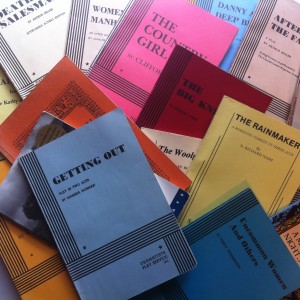O.k., it’s only slightly more fun to find a new monologue than it is to do your taxes without a calculator. But I was thrilled to discover the good folks at Backstage have brought the task into the 21st century with The Monologuer. The Monologuer is a resource to find dramatic and comedic monologues to assist you in preparing for auditions. It contains an assortment of classical and contemporary monologues from plays, including Shakespeare, for males, females, kids, and adults. You can search by author, gender, and theme. It’s a great resource which I highly recommend. Now that you have a world of audition monologues to choose from all in one place, here are some guidelines to help you sort through to find the ones that are just right for you.
.

Your monologue should illuminate YOU
• Choose a piece that lets you showcase the things that make you unique: your idiosyncrasies, point of view, sense of humor, energy and personality. It’s YOU they want to see.
It should be appropriate
• Choose a monologue that matches your age and “type.” Don’t try to play above or below your actual age range. It’s what you know and it’s what they will consider casting you for. An audition is also not the time to play against “type.” They may think you didn’t know better and made a poor choice.
Consider the role you’re auditioning for
• If you are auditioning for a season of comedy, by all means choose a comic piece. If you’re up for a specific role select a monologue that deals with the same kinds of themes or ideas as the script you’re auditioning for. Loss, faith or coming of age for example.
Choose an ACTIVE piece
• Choose a piece where you are trying to get something you need from the person you’re talking to. The stakes should be very high. Life and death is not too high. You should be intent upon trying to get the other person to do, feel or to understand something. Remember to include the extent to which you succeed or fail at the end even if it’s not indicated in the text.
Have an emotional connection
• No matter how funny or deliciously dramatic a monologue might be, if you don’t understand, relate to or identify with the emotions it expresses, choose a different one. You need to show them who you are in the circumstances of the piece. That’s not possible if you have no empathy for the emotional life of the character.
No explanations required, please
• Choose a piece that works on its own, outside the context of the play. You should not have to set it up or explain anything. Everything the listener needs to know should be in the piece.
Keep it short
• I like one to two minutes tops. They’ll know if you can act in the first 10 seconds. Keeping things short and sweet is respectful of their time and plenty of time for you to show them what they need to see.
Traps to avoid
• An audition, in many ways, is like a job interview. Don’t choose a monologue that’s obscene or overtly sexual. There’s plenty of good material out there without the profanity and your choice of material says something about you. Don’t choose to make a potentially bad first impression.
• Choose a piece that’s from an actual well-written, published play. Don’t pick a stand up piece, a sonnet or something you wrote.
• Don’t take a new monologue into an audition. You’re setting yourself up for failure. Learning a piece the night before, or even a week before, is foolhardy. You need time to get a piece in your bones. Know it so well you can do it anytime, anywhere while juggling before you add the audition factor.
Now that you know what to look for, find your piece and start to work. As always, if you have any questions or need help you know where to find me.
[feature_box style=”8″ only_advanced=”There%20are%20no%20title%20options%20for%20the%20choosen%20style” content_font_size=”20″ alignment=”center”]
Sign up HERE to have my acting & audition tips sent directly to your inbox! To say thanks I’ll send you my ebook “The 6 Secrets of a Working Actor”
[/feature_box]
All my best,
Philip
.
Philip Hernandez is a respected acting teacher and singing coach in NYC. He is also the only actor in Broadway history to play both Jean Valjean and Inspector Javert in Les Miserables. He created principal roles in Broadway’s Kiss of the Spiderwoman and Paul Simon’s The Capeman. You may also know him from his many television appearances: The Blacklist, Gotham, Blue Bloods, The Path, Bull, Nurse Jackie, Elementary, Person of Interest, Law and Order, Hostages and Damages to name a few. For information about acting lessons CLICK HERE or singing lessons CLICK HERE.
Follow him on twitter @philip24601, on Instagram @philip24601 and on Facebook at @philip24601.